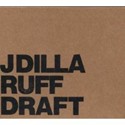
J Dilla
Ruff Draft
Stones Throw
Ruff Draft is appropriately named: it’s full of lopsided drums, discordant synths, and off-kilter samples. It’s also short, sputtering to a halt after a mere 28 minutes – even with the four bonus joints tacked on at the end. To bump up the “beats by the pound” value, Stones Throw included a second disc of instrumental versions – most tracks feature Dilla’s rare and underrated raps (while the lyrics are mostly off-the-cuff and lack substantial meaning, it’s Dilla himself who best shows the way to navigate his tipsy beats). The only track to gurgle past the four-minute mark is “Take Notice.” It’s a skeletal soundscape and one of Dilla’s best splattered with Pac-Man sounds, tick-tocking boom-bap, and sick diction courtesy of Detroit MC Guilty Simpson – a previously unreleased joint spawned from a 49-second interlude on the original vinyl release.
So, if Ruff Draft is just a thought in progress, a sketch in a notepad, how is it so bloody complete? Because it marks the point of departure for an artist who, up to this point, was known for his smoothed out bass and low-key funk productions – think A Tribe Called Quest’s Beats, Rhymes and Life, Common’s Like Water for Chocolate, and the minimal funk of Slum Village. Ruff Draft is complete because it is the perfect portal from J Dilla’s hip-hop roots to his beat auteur future.
“Let’s Take It Back” twinkles in gingerly over Slum Village-esque beats and bass bursts, the distracting micro-melody alerting you to the fact that something very different is going on here. Then the stark keys of “Reckless Driving” punch through the mix and you realize that the title is referencing a creative mind finally free to go wherever it desires; you, the listener, are merely along for the ride.
“Reckless Driving” swerves up to the launch pad of “Nothing Like This;” it’s a rocket ship to outer space. Its backward guitar and bass loop sets the listener adrift in disorienting swirls that dislodge you from any comfortable hip-hop moorings, and the oversized drums pound you like crashing waves – a jarring contrast to Dilla’s distorted and emotional vocal croon, consisting mostly of the song’s title. It becomes a mantric revelation about how Dilla feels about his newfound musical landscape, his new freedom, and it is definitely the emotional heart of the record – a completely new and brave departure.
Surprisingly, “Nothing Like This” bears a striking resemblance to tracks from psych-pop savant Ariel Pink’s Worn Copy – another musical auteur with an encyclopedic knowledge of pop music. Both J Dilla and Ariel Pink are inspired by the static, grit and surprise of ’60s and ’70s radio. But Dilla is the inverse of everything Ariel Pink: Pink plays guitar, bass and keyboards, while channeling the records that inspired him. Dilla achieves sonic innovation on “Nothing Like This” through manipulation of the original source material until he’s sculpted it into something entirely new. Pink creates something eerie and oddly familiar with his new compositions, which sound like ghosts of old radio hits that died before they reached the top of the charts. Dilla re-imagines the old recordings of country, rock, soul and electro as dirty basement funk outside of radio, taking obscure tracks, samples and funk-less drums and breathing new life into those same radio ghosts Pink refuses to exorcise. Consider “Wild,” which features an infectious sample of a cheeky English kid shattering through a cover of Slade’s “Cum on Feel the Noise,” a herky-jerky improbability that Dilla re-works into a danceable anomaly. Dilla is that kid, taking musical hand-me-downs that have become flat and cliché and invigorating them with wonder and purpose. In one 30-minute sketch, Dilla illustrates the genius of beat making.
Hip-hop beatsmiths are musicians of the highest order in the Black community. When the U.S. government cut music programs from inner-city public schools in the 1980s, these would-be instrumentalists and composers found ways to create new music and pay homage to the musicians who came before them. They discovered a tool of empowerment – the sampler – that allowed them to re-make their world, a world that was cold, cruel and unforgiving, into something newer, funkier and freer, a world totally under their control. Dilla is the ultimate conductor of the radio dial, a snake charmer of the canon of western music, putting bounce to a brave new world; a magician of the finest order.
Ruff Draft succeeds in tearing Dilla away from his past and catapulting him into the future. Immediately following this release, Dilla would cut Champion Sound with Madlib and further define his sound. He took up residence at Stones Throw Records and produced his outstanding Donuts – an opus as long as Ruff Draft is short. It’s maddening that we will never know what the “final draft” would sound like – Dilla died from complications of lupus in February 2006. There isn’t enough hip-hop like this: fiercely innovative, blissfully spontaneous and irrepressibly funky. Ruff Draft is a thrilling peek into a brilliant mind. There truly is “Nothing Like This”… . Dilla R.I.P.
Stones Throw: http://www.stonesthrow.com












